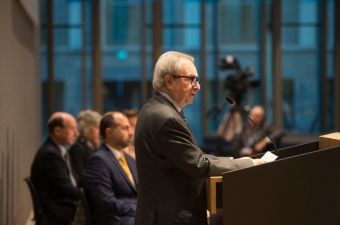The ICTY held its final Symposium on Monday at Leiden University’s The Hague Campus. The full-day Symposium, entitled “Looking Back to Move Forward: Final Reflections on the ICTY”, included four high-level panels, each focusing on a different area of the ICTY’s work and on its relevance for the future of international criminal justice.
Welcoming remarks were delivered by Saskia Bruines, Deputy Mayor for Knowledge Economy, International Affairs, Youth and Education for the City of The Hague; ICTY President Carmel Agius; and Professor Carsten Stahn, Programme Director of Leiden University’s Grotius Centre for International Legal Studies.
President Agius set the tone for the Symposium, observing that “25 years ago today, the United Nations General Assembly met to discuss what one delegate called the ‘continuing tragedy’ in Bosnia and Herzegovina” and “urged the Security Council to consider establishing an ad hoc international war crimes tribunal”, ultimately leading to the establishment of the ICTY. President Agius expressed his aspiration for the Symposium that “[by] looking back today, […] we may continue to move forward tomorrow”.
The first panel focused on the ICTY’s contributions to international criminal courts and tribunals, with the panellists leading a discussion on the groundbreaking role of the Tribunal in paving the way for the establishment and development of other judicial institutions of international criminal justice. The panel was moderated by ICTY Registrar John Hocking, and featured, among others, former ICTY and International Criminal Court (ICC) Judge and current Judge of the Inter-American Court of Human Rights, Elizabeth Odio-Benito.
The ICTY’s contribution to the region of the former Yugoslavia was the topic of the second panel, moderated by Professor David Scheffer, former United States Ambassador at Large for War Crimes Issues. The panellists, who included representatives of civil society from the region as well as Lord Paddy Ashdown, former High Representative for Bosnia and Herzegovina, addressed what the Tribunal was, and was not, mandated to achieve in the region, the significance of the ICTY’s findings for the affected communities, and the Tribunal’s role in building the capacities of the judiciaries in the former Yugoslavia.
During the third panel, moderated by Patricia Sellers, Special Advisor for Gender to the Office of the Prosecutor of the ICC, the ICTY’s contribution to the development of international criminal law was discussed, with the panellists offering their views on the pioneering role of the Tribunal in developing international criminal procedure and in elaborating the elements of international crimes and modes of criminal responsibility. The panel featured, among others: ICTY Judge Alphons Orie; ICTY Judge and former President, Fausto Pocar; and Catherine Marchi-Uhel, Head of the International, Impartial and Independent Mechanism on Syria.
The final session, moderated by Karim A. A. Khan QC, President of the ICC Bar Association, involved leading figures in contemporary international criminal law, who spoke about the future development of the field and the significance of the ICTY’s legacy in this context. The distinguished speakers included: ICTY Judge Christoph Flügge; ICTY Prosecutor Serge Brammertz; ICTY Judge and former President, and current President of the International Residual Mechanism for Criminal Tribunals, Theodor Meron; and ICC President Silvia Fernández de Gurmendi.
The Symposium was the penultimate event in the ICTY Legacy Dialogues series leading up to the closure of the Tribunal on 31 December 2017. The series concludes with the official ICTY Closing Ceremony this Thursday, 21 December at the prestigious Ridderzaal (Hall of Knights) in The Hague, which will be attended by high-level guests including His Majesty, King Willem-Alexander of The Netherlands, and United Nations Secretary-General Mr António Guterres.


